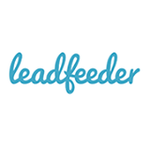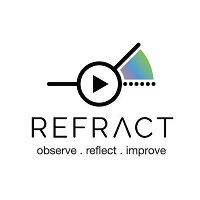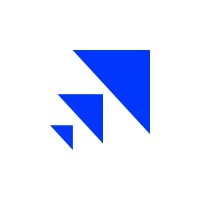Description

Leadfeeder

Refract for Sales
Comprehensive Overview: Leadfeeder vs Refract for Sales
Leadfeeder
a) Primary Functions and Target Markets:
- Primary Functions: Leadfeeder is primarily a web analytics tool that specializes in identifying website visitors and turning them into leads. By integrating with Google Analytics and CRM platforms, it tracks visitor behavior on websites and identifies companies that have shown interest in the products or services offered. This helps sales and marketing teams to understand, segment, and target prospects more effectively.
- Target Markets: Leadfeeder targets B2B businesses that are looking to generate more leads and insights from their web traffic. It's particularly popular among sales teams, marketing professionals, and agencies who want to increase outreach efficiency and sales conversions.
b) Market Share and User Base:
- Leadfeeder has carved out a significant niche in the B2B lead generation market. As of the latest data, it is considered one of the leading tools in web visitor identification and lead nurturing. Its user base includes SMBs to larger enterprises, especially those prioritizing inbound lead generation.
c) Key Differentiating Factors:
- Integrations: Leadfeeder boasts robust integrations with CRM platforms like HubSpot, Salesforce, and email marketing tools, allowing seamless flow of data across systems.
- Ease of Use: Its intuitive interface and easy setup make it accessible to teams without extensive technical expertise.
- Detailed Visitor Insights: Leadfeeder provides detailed insights into visitor behavior, including the pages they viewed and their visit duration, allowing for more personalized approaches.
- Account-Based Marketing (ABM) Features: It offers features that help tailor marketing strategies to specific accounts, making it ideal for targeted campaigns.
Refract for Sales
a) Primary Functions and Target Markets:
- Primary Functions: Refract is a sales coaching and performance platform designed to improve sales effectiveness through call analysis and feedback. It records and analyzes sales conversations, identifying key moments and providing insights to sales teams for enhanced training and performance.
- Target Markets: It targets sales teams across various industries, focusing on businesses that rely heavily on phone sales and customer conversations. It’s used by sales managers and trainers who want to improve team performance and coaching efficiency.
b) Market Share and User Base:
- Refract is a key player in the sales performance and coaching software market, though it is more niche compared to broader CRM or analytics tools. Its user base typically includes mid-sized to larger businesses that prioritize sales training and development as a part of their overall strategy.
c) Key Differentiating Factors:
- Call Analysis and Feedback: Refract specializes in analyzing the content of sales calls, identifying patterns, and providing actionable feedback.
- AI-Powered Insights: The platform uses AI to highlight key moments in conversations and suggest areas for improvement.
- Coaching Tools: It provides a rich suite of features designed to facilitate coaching conversations and improve sales skills over time.
- Focus on Sales Enablement: Unlike other sales tools, Refract explicitly focuses on enablement through improving the quality of interactions rather than just tracking metrics.
Comparison Summary
While both Leadfeeder and Refract for Sales are valuable tools for sales and marketing teams, they serve distinct purposes within an organization. Leadfeeder is about generating and nurturing leads through web analytics, while Refract focuses on enhancing the quality of sales conversations through coaching and feedback. Leadfeeder’s competitive edge lies in its integration capabilities and detailed visitor analytics, whereas Refract differentiates itself with its deep insights into sales conversations and coaching features. The choice between these tools would largely depend on the specific needs of a business with regard to lead generation versus sales training and development.
Contact Info

Year founded :
2012
+358 50 4303422
Not Available
Finland
http://www.linkedin.com/company/leadfeeder

Year founded :
Not Available
Not Available
Not Available
Not Available
Not Available
Feature Similarity Breakdown: Leadfeeder, Refract for Sales
To provide a breakdown of feature similarities and differences between Leadfeeder and Refract for Sales, I will consider general aspects of these types of tools. Please note that specifics might vary depending on each product's updated versions or specific offerings.
a) Core Features in Common
Both Leadfeeder and Refract for Sales are designed to optimize sales processes but focus on different aspects:
-
Lead Management:
- Both platforms facilitate lead generation and management, although the approach might differ. Leadfeeder focuses on identifying visitors to your website, while Refract helps analyze sales conversations.
-
Sales Analytics:
- Each tool provides data analysis to improve sales strategies. Leadfeeder offers insights into website traffic and potential leads, while Refract analyzes sales calls and engagement metrics.
-
Integration Capabilities:
- Both solutions integrate with popular CRM systems (e.g., Salesforce, HubSpot) and other tools like email marketing and communication platforms to streamline workflow.
-
User Support and Resources:
- Offering customer support and providing resources like tutorials, knowledge bases, or webinars to help users maximize the use of their software.
b) User Interface Comparison
-
Leadfeeder: The user interface typically emphasizes simplicity and ease of use, focusing on the visualization of web traffic data and lead information. The dashboard is designed to provide quick access to lead activity and engagement metrics.
-
Refract for Sales: The interface is more centered on content consumption and interaction, providing detailed analysis of call recordings and interactions. The UI generally is designed to facilitate the review and coaching of sales calls, with sections dedicated to analytics, team performance reviews, and coaching feedback.
c) Unique Features
-
Leadfeeder:
- Website Visitor Tracking: A standout feature is its ability to track anonymous website visitors and transform them into leads through data enrichment.
- Lead Scoring: Advanced algorithms to score leads based on their likelihood to convert, enhancing sales outreach efficiency.
- Custom Feeds: Users can create custom feeds based on their criteria to better segment and target leads.
-
Refract for Sales:
- Conversation Intelligence: Unique focus on analyzing sales conversations to extract valuable insights, such as identifying keywords, themes, or sentiment analysis.
- Coaching Tools: Specifically designed tools for coaching sales teams with options for providing feedback directly on recorded calls.
- Sales Rep Performance Tracking: Detailed insights into individual and team performance, allowing sales managers to identify areas for improvement and training needs.
In summary, while Leadfeeder excels in tracking and identifying new leads through website analytics, Refract for Sales focuses more on sales performance optimization through conversation analysis. Both integrate effectively with other platforms, yet they cater to slightly different needs within the sales pipeline.
Features

Not Available

Not Available
Best Fit Use Cases: Leadfeeder, Refract for Sales
Leadfeeder and Refract for Sales are tools designed to support sales and marketing efforts, but they serve different functions and are suited for distinct use cases and business needs.
a) Leadfeeder:
Leadfeeder is primarily a website visitor tracking tool that identifies companies visiting your website, helping to generate leads that sales teams can pursue.
Best Fit Use Cases:
- B2B Companies: Leadfeeder is particularly beneficial for B2B businesses that have longer sales cycles and rely on inbound marketing strategies. It allows these companies to identify potential leads based on website interaction.
- Companies with High Traffic Websites: Businesses that receive a high volume of web traffic can leverage Leadfeeder to sift through visitors and identify prospects that align with their target market.
- Marketing Teams Focused on Lead Generation: Businesses aiming to enhance their lead-generation efforts by converting anonymous website visitors into qualified leads benefit greatly from Leadfeeder.
- Small to Mid-sized Enterprises (SMEs): These companies can use Leadfeeder to expand their reach without the extensive budgets that larger enterprises might have.
b) Refract for Sales:
Refract focuses on sales call analysis and coaching. It allows teams to record, analyze, and improve sales calls and interactions.
Preferred Scenarios:
- Sales Teams Focused on Performance Improvement: Companies that prioritize continuous improvement in their sales processes and team performance can use Refract for better training and coaching insights.
- Businesses with Remote Sales Teams: Companies with distributed or remote sales operations can ensure consistent training and performance monitoring through recorded calls and feedback.
- New Sales Hire Training: Organizations introducing new sales staff or entering new markets can use Refract's capabilities to accelerate onboarding through call analysis and targeted coaching.
- Complex Sales Processes: Companies engaging in complex, consultative sales can use Refract to ensure detailed communication skills are honed and consistent across the team.
d) Catering to Different Industry Verticals or Company Sizes:
-
Leadfeeder:
- Industry Verticals: Leadfeeder is effective across numerous verticals such as technology, financial services, manufacturing, and professional services, where identifying potential business leads through web activity can be crucial.
- Company Sizes: It is particularly advantageous for small to medium-sized businesses that may not have as extensive a sales force and rely heavily on inbound marketing to drive new business.
-
Refract for Sales:
- Industry Verticals: Industries that prioritize direct sales interactions, such as SaaS, telecommunications, and insurance, benefit significantly from Refract. It's especially useful in verticals where the quality of sales conversations significantly impacts sales outcomes.
- Company Sizes: Refract is versatile and can be adapted for use by both large and small organizations. Larger enterprises might use it for structured training programs across multiple teams, while smaller companies can use it to accelerate growth and refine sales techniques.
Both Leadfeeder and Refract for Sales serve distinct purposes and cater to varying needs, making them valuable tools depending on a company’s specific requirements and operational focus in sales and marketing.
Pricing

Pricing Not Available

Pricing Not Available
Metrics History
Metrics History
Comparing teamSize across companies
Conclusion & Final Verdict: Leadfeeder vs Refract for Sales
To provide a comprehensive conclusion and final verdict for Leadfeeder versus Refract for Sales, let's assess each product based on its value, pros and cons, and suitability for different user needs.
Conclusion and Final Verdict:
a) Best Overall Value:
Considering factors such as price, features, user experience, scalability, and support, the choice between Leadfeeder and Refract for Sales largely depends on the specific needs and goals of a business.
-
Leadfeeder: Offers the best value for companies focusing on lead generation, identification of website visitors, and integration with CRM systems. Its strengths lie in enhancing inbound leads and improving marketing ROI.
-
Refract for Sales: Provides more value for organizations prioritizing sales training, performance improvement, and communication analysis. Its robust features for sales calls and coaching make it ideal for building and upskilling sales teams.
b) Pros and Cons:
-
Leadfeeder:
- Pros:
- Efficient identification of website visitors and leads.
- Seamless integration with popular CRM systems.
- Increases ROI for marketing efforts.
- Cons:
- Mainly focused on lead generation; less effective for actual sales enablement.
- Requires a steady flow of website traffic to be most effective.
- Pros:
-
Refract for Sales:
- Pros:
- Advanced tools for sales communication analysis and coaching.
- Enhances sales team performance through effective feedback and insights.
- Facilitates skill development and training.
- Cons:
- Primarily focused on sales calls and training; less on lead identification.
- May require more investment in time to fully utilize its capabilities.
- Pros:
c) Recommendations for Users:
-
Identify Primary Business Needs:
- If your primary need is to convert website visitors into leads and integrate these leads into your CRM system for follow-up, Leadfeeder is the more suitable choice.
- If your sales team requires training, coaching, and performance improvement, Refract for Sales will provide more value.
-
Consider Team Skill Level and Workflow:
- Teams that already have a robust CRM strategy and lead follow-up process might benefit more from Leadfeeder.
- For teams focused on improving sales conversations and coaching, Refract will be more advantageous.
-
Assess Budget and Scalability:
- Evaluate which platform provides features aligned with your budget and can scale with your business needs. Both platforms vary in their focus, so choose one that aligns with long-term objectives.
Ultimately, the best option is contingent on your organization's current focus: marketing and lead generation with Leadfeeder, or sales communication and team enhancement with Refract for Sales.
Add to compare
Add similar companies



